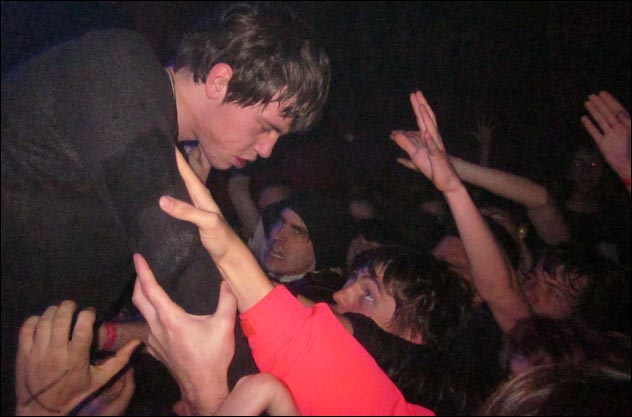
Elias Bender Rønnenfelt staggered onto the stage, a Hamm’s in one hand. He clasped his other hand around the microphone, and then looked blankly from under his canvas hat, out onto the audience, all detachment and potential energy. Unimpressed with what he saw. The show had not started yet. Rønnenfelt was a walking magnetic field.
In ten minutes, Rønnenfelt would be falling into the crowd, wishing it was a mattress and beating the people in the front rows when he realized, over and over again, that it was not. He would be curling in a ball in front of the bass drum. He would be refusing offered replacements for a broken guitar strap, opting to sing lead, dropping his guitar on the ground.
Rønnenfelt’s band, Iceage, from Copenhagen, has become a cause célèbre in the fleeting post-post-post-post punk world, surrounded by much chatter and signed to Matador in the U.S. for their latest album, You’re Nothing. But Iceage excels tremendously in a live setting, where emitted is the distinct feeling of apathy, despite the aural capacity of the band to jab and lurch antagonistically at one’s senses.
There was little point in trying to stand in one place. At the first chords of the set, bodies thrusted and lurched and sandwiched into each other—thank you, Von Trier, “Chaos Reigns”—and it was this repeating intermittent two-minute electrocution that made the pin-drop silences between songs all the stranger. Over and over, the drum sticks clicked, the guitar ch-chnked, and the grinding machine started all over again. Up front, you were either in danger of being trampled or else strangled by Rønnenfelt’s microphone cord.
After the band’s set, Rønnenfelt went outside the Rickshaw Stop, smoked a cigarette and stood there, quietly.
TRENDING:
Live Review: Iceage at the Rickshaw Stop








